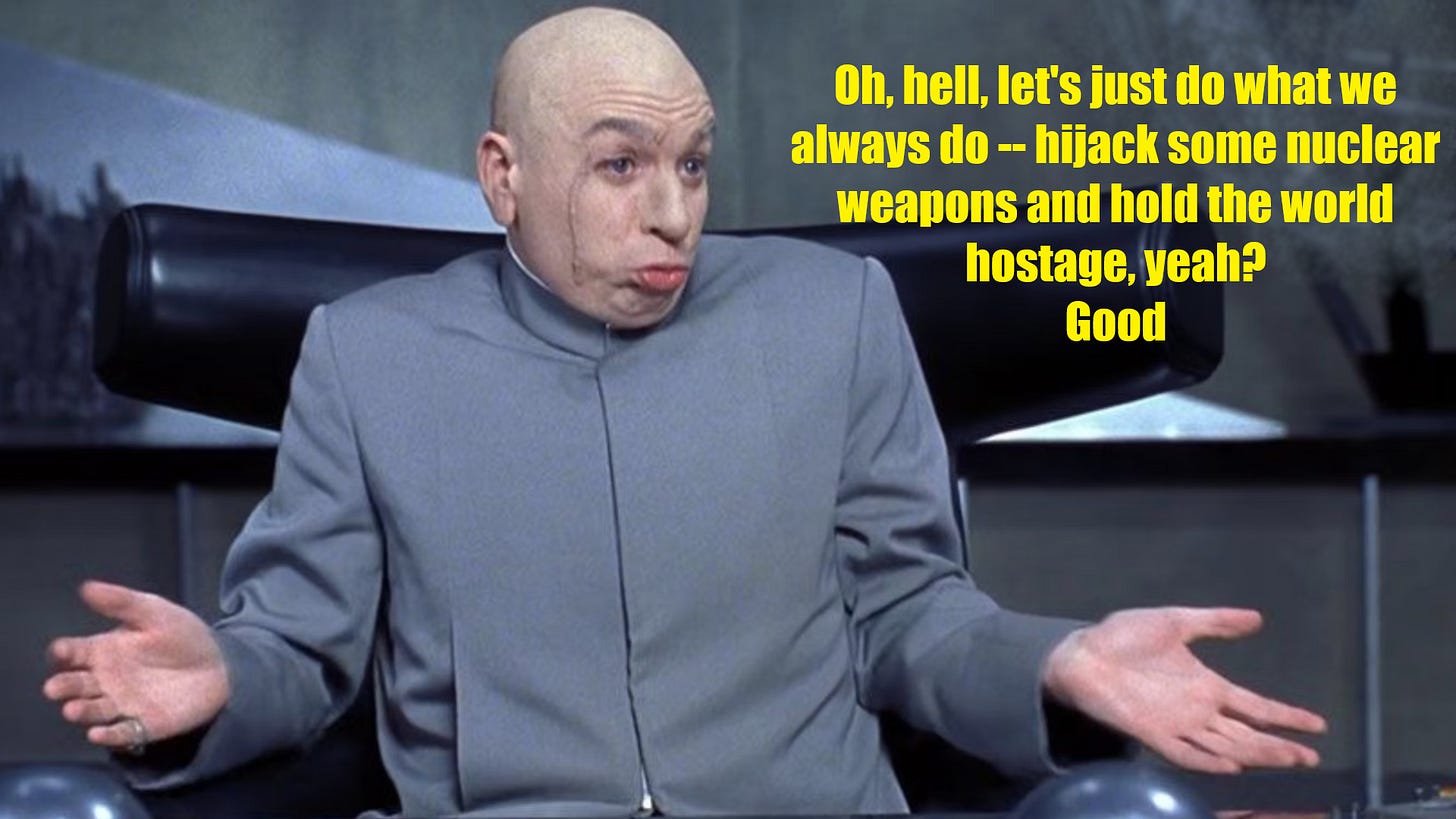How Dr. Evil Would "Fix" the Game Industry
For one billion dollars . . . because if you can’t laugh then you may have to cry.
INTRO
This is a tongue-in-cheek follow up to an article I published recently on what could make things better for game developer job stability. Here is a quick recap for context:
Gamers get the best treatment in the current economic environment.
Investors and publishers are in the middle, even if they have to deal with risk.
Game developers are in the worst position, getting screwed by boom and bust.
Game developers are clearly getting the short end of every stick. Improving that situation requires reducing the amplitude and frequency of the boom and bust cycle. Or better yet, breaking it.
DR EVIL COULD FIX THIS!
Dr. Evil’s goal would be to control the industry while Austin Powers would try to stop him. But if Dr. Evil gained complete control, that would also put a stop to the boom and bust cycle, because boom and bust is economically inefficient (tongue firmly in cheek, even though it's true).
Game developers might not be treated well by Dr. Evil, but at least jobs could be more stable.
Here are some things that Dr. Evil would do. Remember that this is an Austin Powers movie, so allow me some artistic freedom. :) Suspend that disbelief and chant the key verbs: Control, Consolidate, Capture, Create, and Collude!
“Just know that I have a whole bag of 'Shh!' with your name on it.” - Dr. Evil
Control Distribution
Purchase Valve and control the primary distributor of new games on PC. This also provides control over the algorithms for STEAM reviews.
Purchase Epic, or at least the Epic launcher and game distribution business, for the same reason.
Smaller distribution channels like Good Old Games (GOG), Humble Bundle, etc. are lower impact players but potentially useful, so buy them for cheap.
It is possible to deliver your game through a bespoke launcher (been there, done that), but that is also an increased cost, so some barrier to entry.
Consolidate Marketing
Substantially consolidate industry information sources, like PC Gamer, Kotaku, Games Radar, Eurogamer, etc. Begin replacing all the writers with generative AI authors. Secretly require (*wink* *wink*) for-pay reviews.
Find a way to control Metacritic scoring (www.metacritic.com) and manipulate reviews.
Find a way to co opt the biggest streamers and have them push preferred agendas.
Capture Customers
Apple and Google have done this for their phone ecosystems. Epic has been fighting the good fight to break that 30% tax.
Find a way to reverse the trend of cross-platform game delivery so that exclusives have more draw (again).
Create a game subscription service with aspects of a streaming or cable bundle that predisposes gamers to use your own platform. Leverage the sunk cost fallacy that people so often fall for. Oh, wait . . .
PlayStation Plus or Game Pass have not had nearly the same success as the Amazon Prime prepaid shipping tactic. Maybe because Amazon has significant market power and, like health care premiums (paid by your employer in the US), we don’t see the real costs hidden behind the curtain.
If you happen to have, or gain, control over a widely used PC operating system, leverage that power over PC hardware to create a de facto closed platform using the security features of the Trusted Platform Module that is on all motherboards today.
Create Barriers
Purchase Epic Games in order to control the Unreal Engine and charge fees to your competitors .
Purchase Unity Games in order to control the Unity Engine and charge fees to your competitors.
Create, purchase, or start enforcing patents that could be used to knock off or control open source game engines, or force new studios to once again create a game engine from scratch.
Create, purchase, or start enforcing patents around some critical aspects of gameplay, game content delivery, game deployment, or operation.
Collude Implicitly
Coordinate increases in retail “box” pricing, subscription pricing, DLC pricing, etc.
Coordinate segmentation of gamers by some demographic — like game genre — to reduce competition.
Coordinate increasingly draconian clauses in contracts for independent studios and developers to keep them dependent on external sources of funding. OK, this one will not make things better for game developers, but I had to include it because of history.
OUTRO
The resulting industry restructure would increase revenue and decrease competition, and thereby reduce the amplitude of boom and bust cycles. But gamers would pay more money and have less choice.
I’m sure I’ve missed a few things Dr. Evil would do, but the movie runtime is limited. 😜
My goal with this article was to have some fun, because if you can’t laugh then you may have to cry. But we can have fun while calling attention to serious issues for game developers who really need some change.
Catching Up
RESOURCES
Article on boom and bust cycles at Investopedia
Article on price takers (those who must accept a market price)
Two and a half minute YouTube video on price makers and setters
Article on barriers to market entry
Wikipedia article on barriers to entry
Wikipedia article on the Trusted Platform Module
Economic Efficiency: Definition and Examples at Investopedia
Read about elasticity of demand at Investopedia
Wikipedia article with technical description of elasticity of substitution
Read about rival and non-excludable goods at Investopedia
The meaning of secular in economics is “long term trend”
Wikipedia article on secular stagnation
Austin powers quotes collected on this site :)




